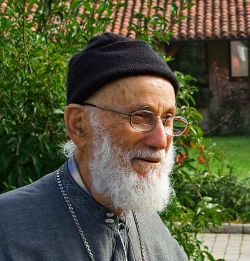The “passover” of metropolitan Emilianos
In the last few months sickness and death have again visited our community, and for the first time in one of its members. Our beloved metropolitan Emilianos (Timiadis) passed from this life to the Father in a rest home of the Eghion diocese in Greece on 22 February; on 10 March 2008 he would have been 93 years old.
Although he was gravely ill on account of a tumor of the liver and pancreas and although doctors strongly cautioned him against traveling, in December 2007 he nevertheless wanted to return to Bose, to spend a last time here, and so to take his leave of our community. He left again at the end of January, to prepare himself for the final passage in his own Orthodox land, with his spiritual son, metropolitan Amvrosios of Kalavrita, at his side.
Elected bishop of Meloa in 1959, then metropolitan of Calabria in 1965, and finally of Silyvria in 1977, he served as permanent representative of the ecumenical patriarchate to the World Council of Churches in Geneva for twenty-five years (1959–1984), observer at the fourth session of Vatican Council II (1965), and member of commissions of dialogue and teacher in various Orthodox, Catholic, and Protestant theological faculties. Metropolitan Emilianos was one of the pioneers of ecumenical dialogue and an indefatigable worker for the unity of the Church: ecumenism for him, as for patriarch Athenagoras, whose worthy spiritual son he was, was never a work of specialists, but an organic element of his very being a Christian, a priest, and a bishop. He considered the division among Christians to be a permanent scandal, a radical contradiction of the Gospel and of Christ’s will, and all this was for him a real cause of suffering, especially when he noted that in the Churches such a situation was accepted by a large portion of Christians resignedly as a matter of fact. “To know how to dialogue,” he used to say, “is an art that not all possess. True dialogue consists in giving and in receiving. It is not enough to know how to talk, it is necessary also to know how to listen. We cannot ignore our neighbor. This is contrary to the law of charity.”
From October 1995 he decided to live at Bose, as a brother in the community, having known br. Enzo since 1968. This choice meant for him, as he revealed to us, “to continue to witness that it is possible for Catholics, Orthodox, and Protestants to live together. This has been my search and my preoccupation all throughout my life… There is a profound communion already attained: it is that which is lived there where the same life is shared”. Even faced with what in a first moment it seemed that he did not understand and did not share in our way of life, br. Enzo recalled in the homily at the mass celebrated in his memory, “he was a man who always tried to see and to listen, hence capable of changing his own opinions through a discernment docile to the Lord, aided in this by an open and humble, as well as rare intelligence. From the time that he decided to live with us as a brother, a monk in the midst of monks, he became in fact for us a father, with his words rich in wisdom and spirituality at meals and in personal encounters, but especially with his example of concrete monastic life, with his prayer, his rigor and his freedom.”
Thankful to the Lord for the gift of the life and presence among us of this “man of God”, we will preserve in our memory especially his words of parting, which he wished to leave with us on the eve of his departure from Bose, Sunday, 27 January, almost a brief spiritual testament, exhorting us to preserve charity and watchfulness in our personal and in our community life.
download the brochure in his memory
We wish also to recall here another great witness and “weaver” of communion between the Churches who finished his earthly course in this same period: the Reformed pastor and theologian Lukas Vischer, who too was an observer at Vatican II. In these last years he collaborated with our community for the project of a common remembrance of witnesses of the faith, involving in this the department Faith and Order of the World Council of Churches that he directed for years.
